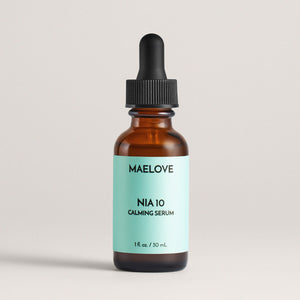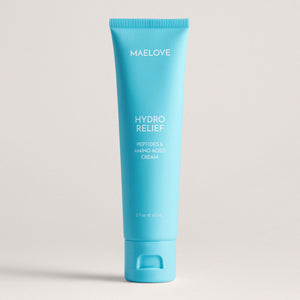Today we address the question, what are some good ways to address dry skin during winter?
The short answer to that is that you should combine skincare products with some small changes in lifestyle routines - in ways that are appropriate for the extra dry air we experience during the wintertime.
Things to take into consideration:
- Fight the temptation to take long, hot showers or baths.
- Use a little less body wash when you shower or avoid it altogether. More on that later.
- Use a humidifier - I’ve tried a LOT over the years and I’ll recommend a couple that I really like myself
- Avoid skincare products with “parfum” - because if you’ve been irritated by skincare products, 4 out of 5 times it’s likely due to added fragrances.
- And finally depending on the level of your skin dryness, I would consider adding to your routine a niacinamide containing moisturizer and we will go over today what to look for to find the right moisturizer for your level of dryness.
Click here for Maelove NIA 10 Niacinamide Calming Serum
Click here for Maelove Hydrator B5 (with Resveratrol) Gel
First of all, why are you more likely to experience dry skin in the winter?
It’s because cold air holds less water content than warm air. So cold air is naturally less humid.
Our skin is basically a wrap around our body to keep water from evaporating, but it is imperfect, and so when the surrounding air is drier it makes the skin’s job harder, and it will experience dryness. There is even a name for this condition and it’s called winter xerosis. .
As we get deeper into the cold winter, a lot of us are dreading the inevitable itchiness and dryness that comes with winter skin. However, here are some things you can do to keep your skin healthy.
The first thing I do is to stay clear of products that can aggravate irritation and dryness. Fragrances and parfum fall in that category.
I love nice smelling things, but fragrances and perfume are some of the most irritating ingredients, and your dermatologist will probably tell you this as well.
So first of all, I don’t use skincare products that have “parfum” on the ingredient label. And I don’t use perfume at all during the winter.
Fragrances are a common culprit of contact dermatitis, an inflamed, itchy rash. A well known example of contact dermatitis is poison ivy. Because contact dermatitis can dry out the skin, it’s important to avoid products that could further aggravate dryness during the winter.
I also change up my shower habits during the winter. I use less body wash when I shower. Like - I’d use about half as much body wash in winter because even if you use cream or gel-based body wash, even the more expensive ones, it would be drying and they are not of the same quality as your nicer face cleansers.
Chances are I’m not sweating as much during the winter. I don’t feel as grimy. So it feels fine to use less body wash when showering. You may even want to skip it altogether. You are washing off the natural lipids and natural moisturizing factors off the surface of your skin that keep it moisturized. Never use soap even in summer but especially not in winter. Soap will make your skin pH more alkaline and impairs the acid mantle which harms your skin’s ability to make the lipids and proteins necessary to form that waterproof skin barrier. So we recommend a well formulated body wash.
And I fight the temptation to take long, hot showers. Because really, nothing dries out your skin like hot water. Because again, it strips those natural oils and moisturizing factors right from your skin.
Humidifiers can make a huge difference. So my husband and I’ve actually tried a whole bunch of humidifiers over the years and I can recommend two specific products. BTW, I’m not sponsored by either of these brands. It’s just what I like.
The first humidifier I like is this Dyson model (show picture). Well, my husband loves it because he’s a dyson junkie. It has a large capacity tank. Very quiet. It‘s simple to maintain. Drawbacks are that this thing is huge and is very expensive.
The second humidifier I recommend, and I personally prefer this, is this Levoit model. It’s petite and quiet but has a huge water tank, pumps out a lot of moisture and is much much more affordable than the Dyson. This is the one I’d buy.
When it comes to skincare products, I personally don’t really do anything different during winter as I have a routine which works throughout the year. However, if you live in very cold climates, you may have to add to your routine.
First off, you may want to add niacinamide to your routine. Niacinamide is important as studies show this will help your skin create more of the natural lipids such as ceramides, cholesterol, and fatty acids that will keep your skin moisturized from the inside out.
Your natural processes however, may be incomplete to combat the dryness. In this case, you can supplement your skin with a moisturizer that contains ceramides, cholesterol, and fatty acids, and other lipids such as oils and butters like shea butter. These latter ingredients are called emollients or occlusive emollients and they work by soaking into your skin to both soften it and help it hold in water, supporting your skin barrier. Choosing the right moisturizer that contains these emollient ingredients as well as niacinamide is an ideal way to help your skin barrier hold in the water the skin needs in the short term and the long term.
Now often, your skin is already dried out before you apply the moisturizer, and so if you want to quickly plump and hydrate your skin before you put on the moisturizer, you may want to use a hyaluronic acid serum. Hyaluronic acid is what we call a humectant. Humectants hold water. Hyaluronic acid basically turns water into a jelly so your skin can hold onto that water instead of having it evaporate. Hyaluronic acid powerfully attracts water also so I like to spritz my face with water before I apply a hyaluronic serum so that it doesn’t pull the water out of my skin but rather holds onto the water I spritzed on. There are other effective humectants out there. You might have heard of natural moisturizing factors or NMFs. Many of these are humectants. So in addition to emollients, your moisturizer may also contain humectants such as hyaluronic acid and NMFs and so do double duty.
Now as we mentioned earlier briefly, it’s important to maintain the acid mantle in order for the enzymes that make ceramides to be effective. So in addition to avoiding soap, you can help preserve the acid mantle using hydroxy acids. This is not an obvious point that acidifying the skin helps keep it moisturized, and so it’s worth another mention. .
So overall, if you are suffering from winter xerosis, we suggest you add a product or products that have humectants like NMFs or hyaluronic acid, niacinamide to help fortify your natural skin barrier from the inside out, ingredients such as hydroxy acids to help maintain your acid mantle, and emollients such as ceramides to give your skin barrier a little bit of extra support.
With the right lifestyle changes and the right products, you can maintain smooth, moisturized skin all winter long.
This writeup was lead-authored by our senior technical adviser, Sunbin Song, PhD. Sunbin graduated from MIT with a degree in Biology before receiving a doctorate in neuroscience from Georgetown and becoming a research scientist at National Institute of Health.
Sources mentioned:
Br J Dermatol. 2000 Sep;143(3):524-31. doi: 10.1111/j.1365-2133.2000.03705.x.
Nicotinamide increases biosynthesis of ceramides as well as other stratum corneum lipids to improve the epidermal permeability barrier
O Tanno 1, Y Ota, N Kitamura, T Katsube, S Inoue





